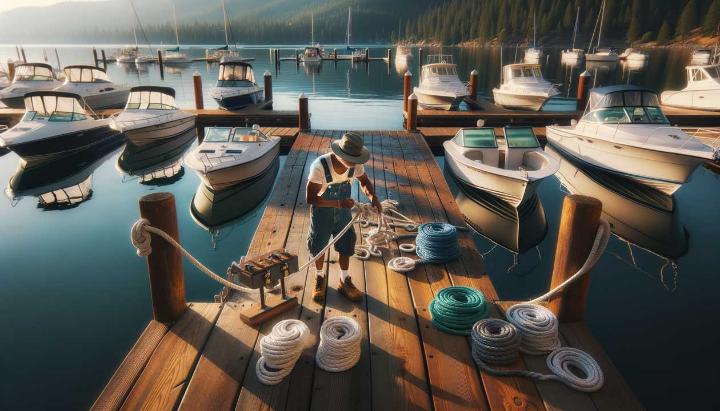Have you ever wondered what makes the perfect mooring rope for your boat? The answer often lies in the material choice and construction. As any seasoned boater will tell you, selecting the right mooring rope is critical for ensuring the safety and security of your vessel. In the realm of boat anchoring, nylon mooring ropes have earned themselves a stellar reputation for their strength, durability, and exceptional stretch capabilities. But why is nylon the go-to material for mooring ropes, and how do you choose the best one for your specific needs?
In this ultimate guide, we'll delve into the nuances of nylon mooring ropes, exploring their unique characteristics and advantages over other materials. We’ll navigate through the essentials of selecting the right rope for your boat – from understanding different types of nylon mooring ropes to determining the appropriate diameter and length. Moreover, we'll provide expert tips on caring for and maintaining your ropes to ensure longevity and optimal performance.
Whether you're securing a luxury yacht or a modest dinghy, mastering the art of selecting and maintaining nylon mooring ropes will keep your vessel safe and your boating experiences enjoyable. Prepare to anchor down as we guide you through everything you need to know about nylon mooring ropes.
Understanding Nylon Mooring Ropes
Nylon is a popular material choice for mooring ropes due to its unique properties that make it well-suited for the task. Let's explore what makes nylon mooring ropes a reliable option for securing your vessel.

Characteristics and Properties of Nylon Mooring Ropes
Strength and durability: Nylon is a strong and durable synthetic material that can withstand the harsh conditions of the marine environment. Nylon mooring ropes are designed to be resistant to water, UV radiation, and various chemical exposures, ensuring their longevity.
Elasticity and stretch: One of the key advantages of nylon mooring ropes is their elasticity. They have a degree of stretch and elasticity that allows them to absorb shock loads and dynamic forces, making them ideal for securing vessels in rough waters.
Applications and Uses of Nylon Mooring Ropes
Nylon mooring ropes have a wide range of applications in the maritime industry, including:
- Securing boats, yachts, and ships in harbors or marinas: Nylon mooring ropes are used to tie up boats of various sizes and keep them secured in their designated areas.
- Anchoring vessels: Nylon ropes are strong and stretchy, making them suitable for anchoring boats, yachts, and even larger ships.
- Towing and recovery operations: The elasticity of nylon ropes allows them to absorb shock loads, making them ideal for use in towing and recovery operations.
Nylon mooring ropes are a reliable choice for securing your vessel due to their strength, durability, and versatility.
Selecting the Right Nylon Rope Mooring
Choosing the right nylon mooring rope is crucial for ensuring the safety and security of your boat. With so many options available, it can be daunting to find the perfect fit. But fear not, fellow boaters! We've got you covered with this comprehensive guide.

Why Choose Nylon Mooring Ropes?
Nylon mooring ropes are a popular choice for several reasons. They offer an exceptional combination of strength, elasticity, and durability, making them ideal for withstanding the rigors of the marine environment. Nylon's elastic nature allows the rope to stretch and absorb shock loads, preventing damage to your boat and ensuring a secure mooring.
Additionally, nylon mooring ropes are highly resistant to UV rays, abrasion, and harsh weather conditions, ensuring their longevity even in the toughest conditions. And let's not forget about cost-effectiveness and availability – nylon ropes are widely available and relatively affordable, making them a practical choice for boaters on a budget.
Factors to Consider When Selecting Nylon Mooring Ropes
Now that you understand the advantages of nylon mooring ropes, let's dive into the factors you should consider when selecting the perfect one for your boat.
- Boat size: The size of your boat is a crucial factor in determining the appropriate rope diameter. Larger boats require thicker ropes to handle the increased weight and stress.
- Weather conditions: If you plan to moor your boat in areas with rough waters or extreme weather conditions, you'll need a more robust and durable rope to ensure a secure mooring.
- Intended use: Consider whether you'll be using the rope for overnight mooring, long-term mooring, or in rough conditions. Each scenario may require a different rope type or construction.
Another important consideration is the rope construction. Nylon mooring ropes typically come in two main varieties: 3-strand and double braid.
- 3-strand ropes: These ropes are made of three twisted strands, offering a more traditional and flexible design. They are often more affordable and easier to splice.
- Double braid ropes: Featuring an inner core surrounded by a braided outer jacket, double braid ropes are more resistant to abrasion and offer better grip. They are generally more expensive but provide superior strength and durability.
When selecting the appropriate rope diameter and length, it's always best to consult with experts or refer to sizing charts provided by reputable manufacturers. They can help you determine the optimal rope size based on your boat's specifications and intended use.
Selecting the right nylon mooring rope is an investment in the safety and longevity of your boating adventures.
By considering factors like boat size, weather conditions, intended use, and rope construction, you can ensure that your nylon mooring rope not only secures your vessel but also withstands the test of time and the elements, providing you with peace of mind and a truly enjoyable boating experience.
Proper Care and Maintenance of Nylon Mooring Ropes
Just like your boat, nylon mooring ropes require proper care and maintenance to ensure their longevity and optimal performance. After all, these ropes are your first line of defense against the unpredictable forces of nature when mooring your vessel. By following a few simple steps, you can extend the life of your nylon mooring ropes and enjoy many years of safe and secure anchoring.

Cleaning and Inspection of Nylon Mooring Ropes
Regular cleaning is essential to maintain the integrity and strength of your nylon mooring ropes. After each use, rinse the rope with fresh water to remove any accumulated salt, dirt, or debris. Saltwater can be incredibly corrosive, and even a small amount of residue can cause premature degradation of the nylon fibers.
For a more thorough cleaning, mix a mild soap solution with warm water and gently scrub the rope using a soft-bristle brush. Avoid using harsh chemicals or detergents, as they can damage the nylon material. Once cleaned, rinse the rope thoroughly and hang it to air dry completely before storing.
In addition to cleaning, regular inspections are crucial for identifying any signs of wear, damage, or chafing. Before each use, carefully examine the entire length of the rope, paying close attention to areas that may have experienced increased stress or friction. Look for any visible fraying, discoloration, or weakened sections.
If you notice any significant wear or damage, it's time to replace the rope. Don't take chances with compromised mooring lines – the safety of your vessel and those aboard is paramount.
Storage and Protection of Nylon Mooring Ropes
Proper storage is key to preserving the integrity of your nylon mooring ropes. Always store your ropes in a cool, dry, and well-ventilated area, away from direct sunlight and extreme temperatures. UV exposure and moisture can cause premature deterioration of the nylon fibers, compromising the rope's strength and durability.
When coiling or storing your ropes, avoid tight bends or kinks, as these can weaken the nylon strands over time. Instead, opt for loose, gentle coils that allow the rope to maintain its natural shape and flexibility.
Additionally, protect your nylon mooring ropes from harsh chemicals, abrasive surfaces, and excessive bending. These can all contribute to accelerated wear and tear, shortening the lifespan of your ropes.
By following these simple steps for cleaning, inspecting, and properly storing your nylon mooring ropes, you'll not only extend their lifespan but also ensure your peace of mind when anchoring your boat. After all, a well-maintained mooring rope is a small investment for the safety and enjoyment of your time on the water.
Invest in the care and maintenance of your nylon mooring ropes, and they'll reward you with years of reliable service. For more insights on rope maintenance, check out our .
Choosing the right nylon mooring rope is essential for secure and reliable boat anchoring. Nylon offers impressive strength, durability, and elasticity, making it an ideal material for mooring rope. This guide covers the basics, helping you understand the benefits of nylon and select the best rope for your needs. Factors like boat size, weather conditions, and the difference between 3-strand and double braid construction are crucial considerations. Proper care and maintenance practices will also ensure your rope's longevity. Invest in high-quality ropes for a safe and enjoyable boating experience.
Get Expert Advice on Your Rope Selection
Fill in the form above to receive personalized recommendations for your rope mooring needs. Our experts are ready to help you choose the perfect mooring rope for your vessel. Don't miss out on enhancing your boating safety and performance!